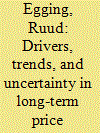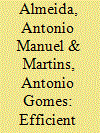|
|
|
Sort Order |
|
|
|
Items / Page
|
|
|
|
|
|
|
| Srl | Item |
| 1 |
ID:
116957


|
|
|
|
|
| Publication |
2012.
|
| Summary/Abstract |
The European Union has unilaterally committed to a 20% reduction of the greenhouse gas emissions and another 20% increase in energy efficiency by 2020. This work presents Ecotax, an economic policy instrument that supports the simultaneous achievement of both objectives, in the building sector.
The proposed instrument is a tax/subsidy scheme attached to the difference between the actual emissions and a specified target. It uses market pricing to value emissions trading price, and is directly integrated into the energy efficiency certification scheme. Thus, minimizing the administrative costs of its establishment.
During the project phase, the tax/subsidy falls on the construction companies which facilitates the funding of innovation in technology. In the operation phase, it falls on proprietors or end-users, stimulating sustainable consuming habits. In both cases, the administration acts as an intermediary, channeling funds from low to high energy efficiency agents, inside and outside the sector itself.
Although the instrument is specifically proposed for the building sector, it is easily translatable to other sectors that are not necessarily included in the emission allowance trading scheme of the European Union.
|
|
|
|
|
|
|
|
|
|
|
|
|
|
|
|
| 2 |
ID:
125757


|
|
|
|
|
| Publication |
2013.
|
| Summary/Abstract |
Buildings are responsible for almost 40% of energy consumption and CO2 emissions in the EU (EC, 2010). Improving the energy efficiency of buildings is a vital step towards achieving the EU climate and energy objectives. Directive 2010/31/EU outlines measures specifically focused on the energy performance of buildings. Incentives are created for building operators to optimize their energy sub-systems in a more robust, energy-efficient, and cost-effective manner. The challenge is to choose efficient energy-supply portfolios accounting for technological and market deregulation and risks. Decision support tools for energy management in public buildings using future scenarios of market and technological developments would be beneficial. The aim of this paper is to discuss the drivers and uncertainties in the recent and future energy market trends and prices, including technological progress and developments in fossil-fuel markets. This discussion is relevant for researchers and policymakers in general, and in particular, as an input for scenarios used in the development of decision support systems.
|
|
|
|
|
|
|
|
|
|
|
|
|
|
|
|
| 3 |
ID:
128339


|
|
|
|
|
| Publication |
2014.
|
| Summary/Abstract |
The behavior of building designers is conditioned by the existing legislation and regulations in the national context in which they operate. However, in the Portuguese legislation there are no rules concerning the use of daylight, and therefore, designers are not stimulated to adopt solutions that make use of the existing potential of sunlight availability. In the same way, it is difficult to understand the lack of specific regulation, with quantified targets, limiting power density of artificial lighting installed inside buildings. The present opportunity, generated by the need to carry out the revision of Portuguese building energy systems regulation, should be used to fill the existing gap in national legislation regarding those matters. In this paper the authors present some proposals for future legislation that will have as central purpose the utilization of efficient lighting systems and the promotion of architectural solutions that optimize the use of daylighting. It is possible, and desirable, to add new directives to national legislation that contribute to the improvement of Portuguese buildings, characterized by its good performance in terms of daylight availability, and at the same time, increasing the energy efficiency and reducing the energy consumption of lighting systems installed in those buildings.
|
|
|
|
|
|
|
|
|
|
|
|
|
|
|
|
| 4 |
ID:
123278


|
|
|
|
|
| Publication |
2013.
|
| Summary/Abstract |
Energy efficiency and conservation in buildings are major concerns and priorities for the Malaysian government. The Japanese Cool Biz concept and campaign has proven to be effective in reducing and conserving energy during the summer period, and other countries are beginning to adopt it. Malaysia, as a country with hot weather throughout the year, may have lots to gain from the concept; particularly in the energy management of office buildings. However, Cool Biz is not well known in Malaysia and the perception of Malaysian office workers toward the Cool Biz concept remains unclear. This study seeks to identify the Cool Biz elements that can contribute to and complement energy conservation efforts, and seeks the opinions of Malaysian office workers toward the concept. The study adopts a discriminant analysis methodology to determine if there are significant differences of opinion among gender category, age groups and races in Malaysia on the Cool Biz concept. The findings showed that overall, Malaysians find Cool Biz a good concept. However, there were significant differences in opinion among the social groups. The most significant differences in opinion were within the race category vis-a-vis Malay, Chinese and Indian office workers.
|
|
|
|
|
|
|
|
|
|
|
|
|
|
|
|
|
|
|
|
|